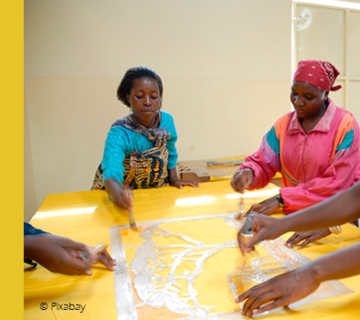Helping hope to bear fruit. This was the seed that Pope Francis planted during his apostolic journey to Budapest on 12 September, at the concluding mass of the 52nd International Eucharistic Congress, just before traveling to Slovakia. The highlight of this brief stop was the Statio Orbis, “a pause for commitment and prayer” in which the individual churches united in communion with the pope around the Eucharistic mystery to deepen their faith. Some Focolare members who were present at the event tell of their experience.
The famous Chain Bridge holds Buda and Pest together by leaping the Danube, an evocative image recalled several times by Pope Francis during his recent apostolic visit to Hungary.
Among the themes of this trip, which concluded in Slovakia on September 15, were suppression and martyrdom, the evangelizing mission and, of course, ecumenical and interreligious dialogue. The latter are only possible if, at the foundation, there is ‘a great desire for unity,’ as the pontiff stressed in his speech during the meeting with representatives of the Ecumenical Council of Churches and Jewish communities.
“We are not fully aware of how special the presence of so many Christian denominations is in Hungary,” says Eszter, 47, who is married and mother of 5 children. She is director of Città Nuova Publishing House in Hungary (Új Város) and editor of the column on spirituality in the online magazine of the same name.
“The Focolare Movement here already does important work in terms of both ecumenical and interreligious dialogue, but we can and must do more. The pope’s joy spurs us on to make more use of this specific calling of ours.
“Living for our brothers and sisters means rediscovering that unity and Jesus Forsaken are two sides of the same coin, and this journey can only be taken on by nourishing ourselves on the Eucharist.”
It’s a shared uphill path to be followed together. This is the unity that this people has so badly needed to hear, explains Ágoston, a radio presenter who has worked in recent years as director of communications for the Eucharistic Congress.
“I have never in my life had such a strong desire for unity as I do now. Unity understood, of course, as dialogue with the representatives of the various religions, but also as a rapprochement between us, members of the Focolare, Hungarian men and women.
“It seems to me a great challenge to strive to defend values, and at the same time seek a relationship with the people around us. Recently it seems that these factors are mutually exclusive, but this is not true. We must have more courage in approaching one another, accepting the risk.”
It is for this reason that Pope Francis in the heart of Europe, ‘ploughing’ through places that have suffered the violence of totalitarianism, invites everyone to become ‘roots’ – roots of peace that, by stirring the soil of memory, are capable of nourishing it and making the future sprout.
This hope also lives in the heart of Gergely, a young Hungarian father, who is editor of Città Nuova.
“I was very struck by a phrase the pope said during his final homily in Heroes’ Square in Budapest, at the conclusion of the International Eucharistic Congress. The Eucharist urges us to ‘break ourselves for others’. I need the Eucharist as spiritual nourishment.
“It is a very powerful way to get out of ourselves, and thanks to it, we are less and less willing to ignore each other. When I come out of church and have a discussion with my wife after Holy Communion, I immediately feel the difference.
“Jesus loves me no matter who I am, so how can I not see someone else with his eyes? The discussion becomes a deep conversation that ends in reconciliation. We should see the other as someone to serve, love and accept, and I am sure the Eucharist can help us in this challenge.
“I have always experienced the presence of so many churches in Hungary as enriching, and my dream is to be united with all of them. I would always like to focus on what really binds us, and this is what Chiara Lubich’s charism has taught me over the years: to build bridges and find Jesus in every person.”
Maria Grazia Berretta


 Italiano
Italiano Español
Español Français
Français Português
Português




La Sainte Trinité fait preuve de l’unité. Ainsi je me dis, à chaque fois je sors de ma porte pour la sainte Eucharistie, j’y vais non seulement pour rencontrer le Christ, communier en son corps et son sang, mais aussi à la rencontre du prochain. Une telle attitude fortifie ma foi de vivre en communion avec les autres dans l’Eucharistie.